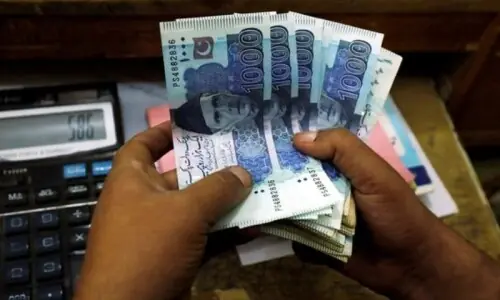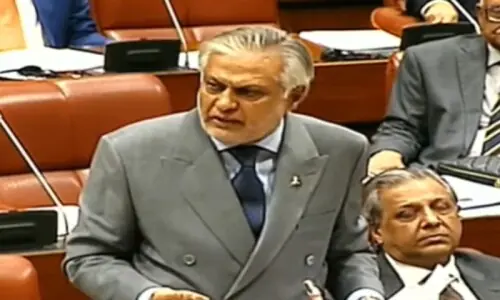Originally published on Feb 6, 2023
Ishaq Dar’s boastful comeback has deepened Pakistan’s economic turmoil. In a fairly short stint, Mr Dar has not only worsened his party’s political prospects but has also brought Pakistan on the verge of defaulting on external debt despite taking over the baton after Pakistan secured the International Monetary Fund (IMF)’s clubbed seventh and eighth tranches.
Finding himself short on time and alternatives, Mr Dar reluctantly caved into accepting the IMF conditionalities. The consumer price index has already clocked in at a 48-year high of 27.6 per cent for January. Regrettably, it only captures the partial impact of the steep plunge in the rupee and premature petrol price hike and is also not due to the low-base effect either. Hence, the worst of the ongoing inflationary spiral is yet to come.
In these extremely testing times, it becomes pertinent to understand the ideal avenues where one can invest to protect hard-earned money from losing its value in real terms. Pakistan has had an abysmal saving rate historically and, in the prevailing conditions, people would be unable to save much of what they earn.
Besides, whatever little savings they amass is for a maximum of a few months. So, there is a tendency to place this tentatively idle money in a current account. In the absence of a sound regulatory framework, commercial banks also wheedle their customers into doing the same, with the policy rate standing at an elevated level.
Risk-averse investors can opt for money-market mutual funds, while others with moderate risk appetites can invest in income funds
With the headline inflation making new highs and the local currency hitting new lows, the above example is metaphorically equivalent to watching your money burn slowly in the fire. Others simply end up placing money in a Profit and Loss/Saving account.
However, the return on offer is uncompetitive. Ideally, the masses should route their savings via mutual funds. Asset Management Companies have streamlined their operational processes by creating digital onboarding journeys that enable swift and easy online account opening. This requires an investor to input basic know-your-customer details, followed by compliance screening and document upload. Upon successful ID creation, the system asks for the customer’s risk profile and filters products based on the selection.
Risk-averse investors can prefer money-market mutual funds, while others, with up to moderate risk appetites, can invest in income funds. Simply put, fixed-income mutual funds provide better returns than saving accounts due to their sizes and the expertise of fund managers who actively place the inflowing funds into instruments yielding competitive returns in the market.
The money market funds yielded a 14pc return in the outgoing calendar year against 11pc that of saving deposits, translating into a spread of 300 basis points. Even in December, the returns on saving deposits stood at 14pc. On the flip side, conventional and Islamic fixed-income funds offered up to 16pc and 15pc profits, respectively, for the same month.
Equities are generally considered a go-to avenue for investors with a high-risk appetite. The stocks in the Pakistan Stock Exchange (PSX) stand at historically low multiples, and with IMF around the corner, the market may witness a surge in the coming days.
However, the PSX has some fundamental shortcomings. The number of active investors is awfully low, with a major concentration in the hands of a few institutional players. This lack of depth makes it extremely volatile. To exemplify, the benchmark KSE-100 index offered –21.1pc, 7.4pc, 1.9pc, and –6.5pc returns from 2019 to 2022, respectively.
A foremost concern among the masses revolves around the country’s fragile currency. While the apprehension seems legitimate, people can hedge this currency risk by seeking exposure against gold. It was the best-performing asset class last year with over 40pc return, partly due to appreciation in its price and partly due to steep currency devaluation. People who can not afford to buy a jewellery set or a gold bar can invest in a collective investment scheme that provides exposure against this safe haven commodity.
Real estate is another high-yielding asset class in Pakistan. The much sought-after avenue in the wake of a surging population is also home to most of the country’s ill-gotten wealth. Resultantly, the real prices appreciate perpetually, making the sector largely out of reach for people from mid to bottom socioeconomic classes.
However, people can invest in a slew of upcoming real estate investment schemes (REIT). REIT schemes solve this quagmire by providing investors exposure to income-generating real estate without the need to finance/purchase it. Investors buy units of REIT schemes as per their ability and willingness and earn proportionate dividends.
All in all, people have a slew of investment options at their disposal and must make a reasonable effort to identify suitable asset classes and diversify savings among them.
The writer is a finance professional and a graduate of IBA, Karachi
Published in Dawn, The Business and Finance Weekly, February 6th, 2023






























